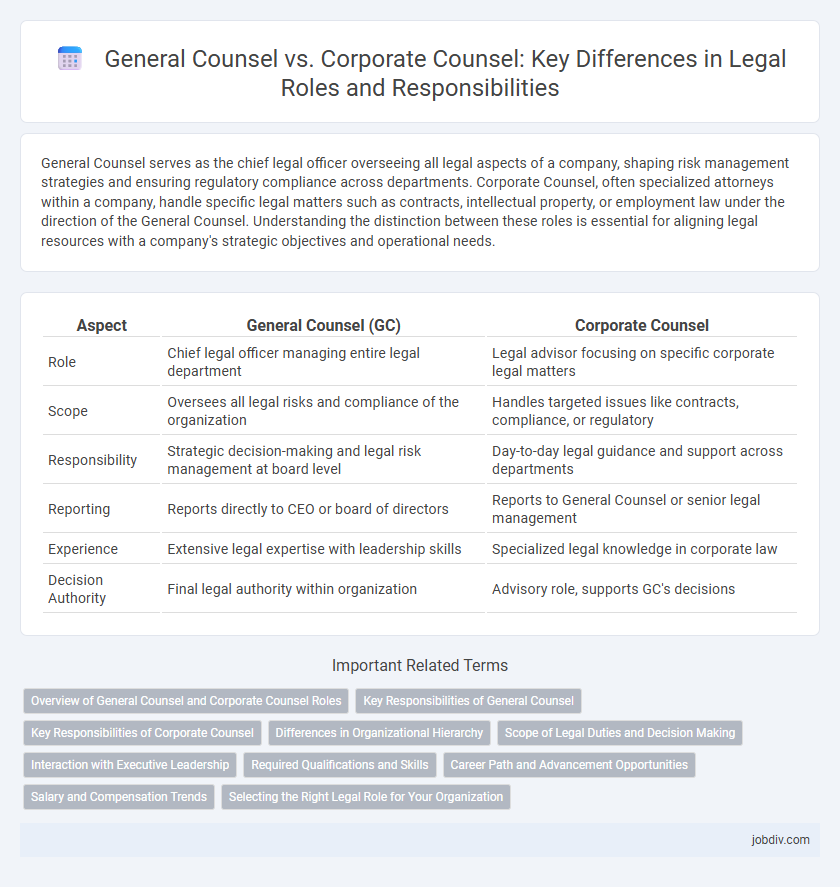General Counsel serves as the chief legal officer overseeing all legal aspects of a company, shaping risk management strategies and ensuring regulatory compliance across departments. Corporate Counsel, often specialized attorneys within a company, handle specific legal matters such as contracts, intellectual property, or employment law under the direction of the General Counsel. Understanding the distinction between these roles is essential for aligning legal resources with a company's strategic objectives and operational needs.
Table of Comparison
| Aspect | General Counsel (GC) | Corporate Counsel |
|---|---|---|
| Role | Chief legal officer managing entire legal department | Legal advisor focusing on specific corporate legal matters |
| Scope | Oversees all legal risks and compliance of the organization | Handles targeted issues like contracts, compliance, or regulatory |
| Responsibility | Strategic decision-making and legal risk management at board level | Day-to-day legal guidance and support across departments |
| Reporting | Reports directly to CEO or board of directors | Reports to General Counsel or senior legal management |
| Experience | Extensive legal expertise with leadership skills | Specialized legal knowledge in corporate law |
| Decision Authority | Final legal authority within organization | Advisory role, supports GC's decisions |
Overview of General Counsel and Corporate Counsel Roles
General Counsel serves as the chief legal officer, overseeing a company's entire legal strategy, risk management, and compliance to protect organizational interests. Corporate Counsel typically operates within the in-house legal team, providing specialized legal advice on specific areas such as contracts, employment law, and regulatory issues. Both roles are critical for ensuring legal adherence, but General Counsel holds a broader executive responsibility with direct reporting to the board.
Key Responsibilities of General Counsel
General Counsel serves as the chief legal advisor to the corporation, overseeing all legal matters, including regulatory compliance, risk management, and corporate governance. They lead the legal department, providing strategic guidance on high-stakes transactions, litigation, and intellectual property issues. Their key responsibilities include advising the board of directors, managing external counsel, and ensuring the company's legal interests align with its business objectives.
Key Responsibilities of Corporate Counsel
Corporate Counsel primarily manage internal legal matters, including contract review, compliance monitoring, and risk management within the organization. They provide legal advice to various departments, support corporate governance, and handle employment law issues to ensure regulatory adherence. Their role often involves coordinating with external law firms and facilitating communication between business units and the legal department.
Differences in Organizational Hierarchy
General Counsel typically holds the highest-ranking legal position within an organization, leading the entire legal department and reporting directly to the CEO or board of directors. Corporate Counsel, often referred to as in-house counsel, usually occupies a subordinate role within the legal team, focusing on specific legal matters or business units and reporting to the General Counsel. The distinction in organizational hierarchy reflects the scope of responsibility, with General Counsel overseeing broad legal strategy while Corporate Counsel handles specialized or transactional legal work.
Scope of Legal Duties and Decision Making
General Counsel typically oversees the entire legal strategy of the organization, managing risk, compliance, and high-stakes litigation across multiple jurisdictions. Corporate Counsel often specializes in specific areas such as contracts, employment law, or regulatory compliance within a single business unit. Decision-making authority for General Counsel includes setting legal policies and advising senior executives, whereas Corporate Counsel primarily supports ongoing operations with tactical legal advice.
Interaction with Executive Leadership
General Counsel serves as the chief legal advisor to the executive leadership team, influencing strategic decisions and company policies at the highest level. Corporate Counsel typically supports specific business units or departments, offering tailored legal guidance while collaborating closely with senior executives to ensure alignment with overall corporate objectives. Both roles require effective communication and trust with leadership to navigate regulatory risks and drive informed decision-making.
Required Qualifications and Skills
General Counsel typically requires a Juris Doctor (JD) degree, admission to the bar, and extensive experience in corporate law, with strong leadership and strategic decision-making skills. Corporate Counsel also needs a JD and bar admission but often focuses on specialized knowledge in areas such as compliance, contracts, or intellectual property, emphasizing analytical skills and regulatory expertise. Both roles demand exceptional communication, risk assessment, and negotiation abilities to effectively support the organization's legal needs.
Career Path and Advancement Opportunities
General Counsel typically serves as the chief legal officer of a company, overseeing all legal aspects, and usually requires extensive experience in corporate law, often gained through years as Corporate Counsel. Corporate Counsel roles often serve as a stepping stone, providing specialized legal expertise within specific departments or regions, which can lead to advancement into senior legal positions or eventually General Counsel roles. Career progression for Corporate Counsel generally involves increasing responsibility, such as managing legal teams or handling complex transactions, whereas General Counsel positions focus on strategic leadership and executive decision-making.
Salary and Compensation Trends
General Counsel typically earn higher salaries than Corporate Counsel, reflecting their broader responsibilities and leadership roles within organizations. Compensation trends show that General Counsels receive substantial base salaries combined with performance bonuses, stock options, and other incentives, especially in Fortune 500 companies. Corporate Counsel compensation is growing steadily, with competitive base pay and benefits, but usually lags behind General Counsel due to narrower scopes of work and less executive-level influence.
Selecting the Right Legal Role for Your Organization
Choosing between General Counsel and Corporate Counsel depends on the organization's size, legal needs, and budget. General Counsel typically serves as the chief legal officer responsible for overseeing all legal matters and managing the legal department, while Corporate Counsel often handles specific legal issues or supports the General Counsel in larger companies. Assessing factors such as the complexity of legal challenges, required expertise, and organizational structure helps determine the best fit for efficient legal management.
General Counsel vs Corporate Counsel Infographic

 jobdiv.com
jobdiv.com